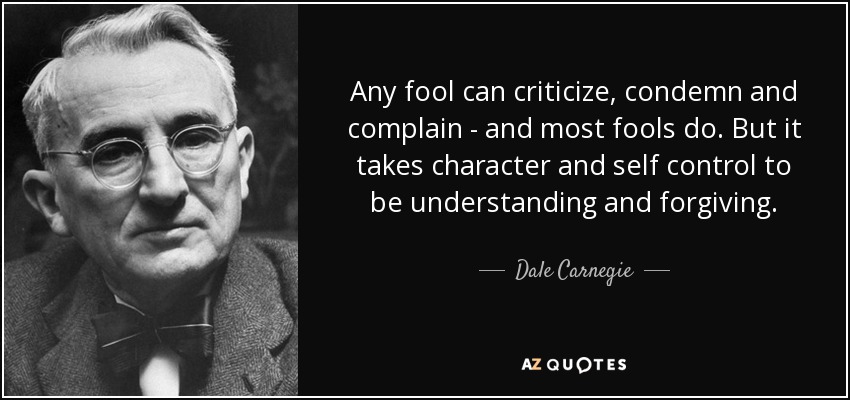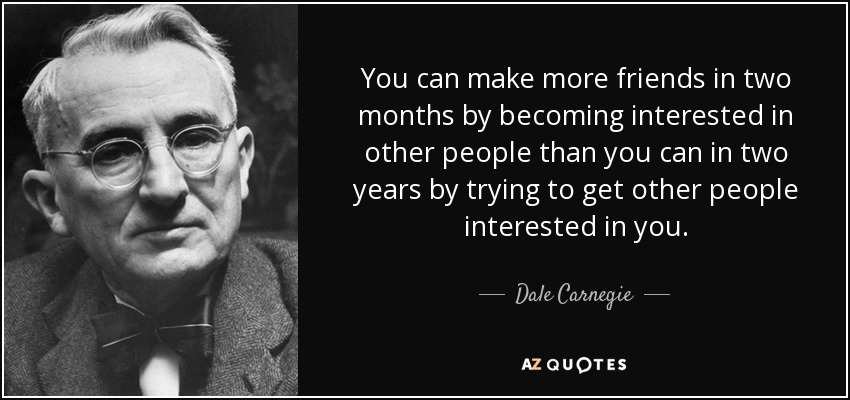Click here to return to Blog Post Intro

Dale Carnegie epitomizes the story of personal improvement and development. He grew up on a farm, attend the State Teacher’s College of Warrensburg, Missouri, and then became a traveling salesperson. He began teaching a course on public speaking at a Young Men’s Christian Association (YMCA) in New York City, from which he began developing the course that inspired How to Win Friends and Influence People. He wrote the book in a light, conversational style, as if he were giving advice to a close friend, and it became a bestseller. This book is considered one of the most popular classic self-help books.
Carnegie pointed out that there are three fundamental techniques to improve your ability to manage others:
1. Avoid any kind of criticism, complaint, or other type of negative tactic.
2. Frequently give earnest appreciation and praise.
3. Find a way to encourage others to want what you want.
He went on to suggest that leaders should phrase their requests as questions. They should also encourage others to live up to reputations that might not have been earned yet.
Instaread noted 9 key takeaways from the book that are highlighted below.
Key Takeaway 1: Social skills and public speaking, vital skills in business and personal life, are in high demand.
When Dale Carnegie started teaching courses on social skills and public speaking, he was surprised by the demand for such instruction. Surveys revealed that people want to learn these skills which often result in career advancement and better relations at home.
Key Takeaway 2: In order to make friends and acquire influence, do not criticize others.
To relate to others, call attention to mistakes indirectly and make problems seem easy to correct. Being singled out for a mistake or admitting to a mistake can be humiliating and can make people defensive.
The best leaders give others a way to admit to a mistake without fear of being judged or having to admit incompetence.
Key Takeaway 3: Earnest appreciation makes others agreeable, so begin with praise and comment on every slight improvement with positivity.
Honest and sincere appreciation makes other people more likely to listen to new ideas and accept suggestions.
Studies indicate that praising children for being smart or being born with a skill makes them less likely to improve because they will cease to see their success as a result of hard work. Instead, praise should focus on the traits that the child can improve or allow to deteriorate, like good manners at the dinner table, and or progress toward mastery of a skill.
Leaders in particular should be quick to praise and appreciate even the slightest improvements. They should also admit their own mistakes and imperfections before offering criticism. (For more, check out my summary of 5 Languages of Appreciation in the Workplace.)
Key Takeaway 4: People with good social skills can make others want what they want.
The best way to get others to do things is by giving them a reason to be happy about doing them.
A vital skill in managing people is to “arouse in the other person an eager want” to do whatever is asked of them.
Key Takeaway 5: Others will like you more if you become genuinely interested in them, talk about their interests, and make them feel important.
The best way to earn the interest of others is to be interested in them. Listen well, let others do the talking, smile, and commit their names to memory. People with influence actually let others talk more in conversations.
In her 2012 book The Charisma Myth, Olivia Fox Cabane explains that this strategy runs counter to the assumption that a more interesting person will speak more. She writes that, if people wish to seem charismatic, they need to do to the opposite of this stereotype about charismatic people dominating conversations, telling long stories, and directing conversations. Instead, being charismatic involves attentive listening without interrupting. Oddly enough, if someone is a good listener, other people consider that person to be charismatic and engaging.
Key Takeaway 6: Conversations rely on positive first impressions, and the best outcomes arise from conversations that start with friendliness, a smile, and points of agreement.
One side can make the other side more agreeable by asking questions about which both sides will agree. From there, they can seek consensus on more contentious topics.
Key Takeaway 7: Socially skilled people avoid arguments because they cannot be won gracefully.
Influential people show respect for others’ opinions, try to see the issue from others’ perspectives, exercise sympathy, and admit when they are wrong.
Even when a person knows how to win an argument, the polite thing to do is not to engage in the argument because even the winner of an argument comes away looking immature or rude. People are highly unlikely to change their minds especially when confronted in an argumentative tone.
While arguments have winners and losers, conversations are intended to provoke thought rather than demonstrate why someone else is wrong.
Key Takeaway 8: Making others want to do things can involve letting those people think the idea was theirs.
People are more likely to carry out a plan if they believe the plan was their idea in the first place.
Good leaders ask questions to bring others into agreement with them about a solution. They do not give direct orders. (For more, check out my summary of John Maxwell’s Good Leaders Ask Great Questions.)
Letting the other side of a negotiation suggest solutions and express their interests, and then asking questions to bring the other negotiators to the same side of the issue indirectly, are a significant part of the art of negotiation.
Key Takeaway 9: People can also be motivated through challenges, appeals to noble concepts, or dramatic demonstrations of ideas.
They will often try to uphold a good reputation if one is given to them. In fact, leaders might assign a reputation for good work to a lax worker in order to encourage him or her to uphold a standard in the workplace.








